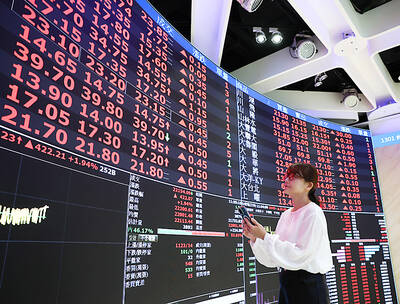Eying the potential of e-commerce, Yahoo-Kimo Inc (雅虎奇摩), the nation's largest Internet portal, yesterday launched its second online store.
"There is huge room for e-commerce to grow," Rose Tsou (
Online shopping in the nation was worth NT$20.4 billion last year, making up 0.39 percent of all domestic retail business, Tsou said, citing statistics from the Institute for Information Industry (資策會). The institute estimated that the figure will rise 30 percent to NT$26.6 billion this year.
In the US, business-to-customer (B2C) e-commerce accounts for about 1.5 percent of the retail sector, showing that Taiwan's e-commerce sector was still in its infancy, Tsou said.
To compete with other virtual competitors, as well as brick-and-mortar rivals, Yahoo-Kimo's new shopping mall offers zero-interest installment plans, said Charlene Hung (
The Internet company also allows customers to pay three months after they order, Hung said. But if customers wish to return or exchange goods, they are required to file such requests within seven days after receiving the goods, she added.
Sharon Hsu (許佩雯), a marketing official at rival PC Home Online (網路家庭), the nation's fourth largest Internet portal, said there was much potential for B2C e-commerce to grow, as business at the company's three online shopping malls had enjoyed brisk sales since September last year.
Hsu refused to reveal sales figures, saying only that PC Home's sales averaged NT$100 million a month.
While e-commerce is again being ballyhooed as the next big thing in retailing following a slump starting in 2000, one e-commerce expert, however, said that this does not mean every online store will be able to make money.
"Online stores now not only compete with each other and physical stores, but also with consumers," said George Wei (
For example, there are various customer-to-customer (C2C) platforms such as online auction sites, led by Yahoo-Kimo with transactions worth more than NT$10 billion, which is more than most online stores sell, Wei said.

UNCERTAINTIES: Exports surged 34.1% and private investment grew 7.03% to outpace expectations in the first half, although US tariffs could stall momentum The Chung-Hua Institution for Economic Research (CIER, 中華經濟研究院) yesterday raised its GDP growth forecast to 3.05 percent this year on a robust first-half performance, but warned that US tariff threats and external uncertainty could stall momentum in the second half of the year. “The first half proved exceptionally strong, allowing room for optimism,” CIER president Lien Hsien-ming (連賢明) said. “But the growth momentum may slow moving forward due to US tariffs.” The tariff threat poses definite downside risks, although the scale of the impact remains unclear given the unpredictability of US President Donald Trump’s policies, Lien said. Despite the headwinds, Taiwan is likely

READY TO BUY: Shortly after Nvidia announced the approval, Chinese firms scrambled to order the H20 GPUs, which the company must send to the US government for approval Nvidia Corp chief executive officer Jensen Huang (黃仁勳) late on Monday said the technology giant has won approval from US President Donald Trump’s administration to sell its advanced H20 graphics processing units (GPUs) used to develop artificial intelligence (AI) to China. The news came in a company blog post late on Monday and Huang also spoke about the coup on China’s state-run China Global Television Network in remarks shown on X. “The US government has assured Nvidia that licenses will be granted, and Nvidia hopes to start deliveries soon,” the post said. “Today, I’m announcing that the US government has approved for us

When Lika Megreladze was a child, life in her native western Georgian region of Guria revolved around tea. Her mother worked for decades as a scientist at the Soviet Union’s Institute of Tea and Subtropical Crops in the village of Anaseuli, Georgia, perfecting cultivation methods for a Georgian tea industry that supplied the bulk of the vast communist state’s brews. “When I was a child, this was only my mum’s workplace. Only later I realized that it was something big,” she said. Now, the institute lies abandoned. Yellowed papers are strewn around its decaying corridors, and a statue of Soviet founder Vladimir Lenin

The National Stabilization Fund (NSF, 國安基金) is to continue supporting local shares, as uncertainties in international politics and the economy could affect Taiwanese industries’ global deployment and corporate profits, as well as affect stock movement and investor confidence, the Ministry of Finance said in a statement yesterday. The NT$500 billion (US$17.1 billion) fund would remain active in the stock market as the US’ tariff measures have not yet been fully finalized, which would drive international capital flows and global supply chain restructuring, the ministry said after the a meeting of the fund’s steering committee. Along with ongoing geopolitical risks and an unfavorable